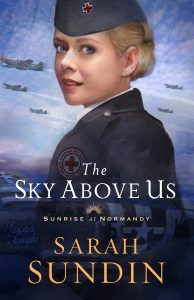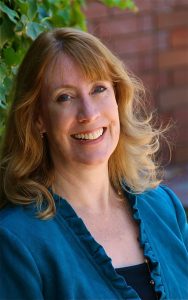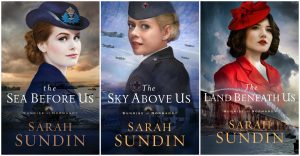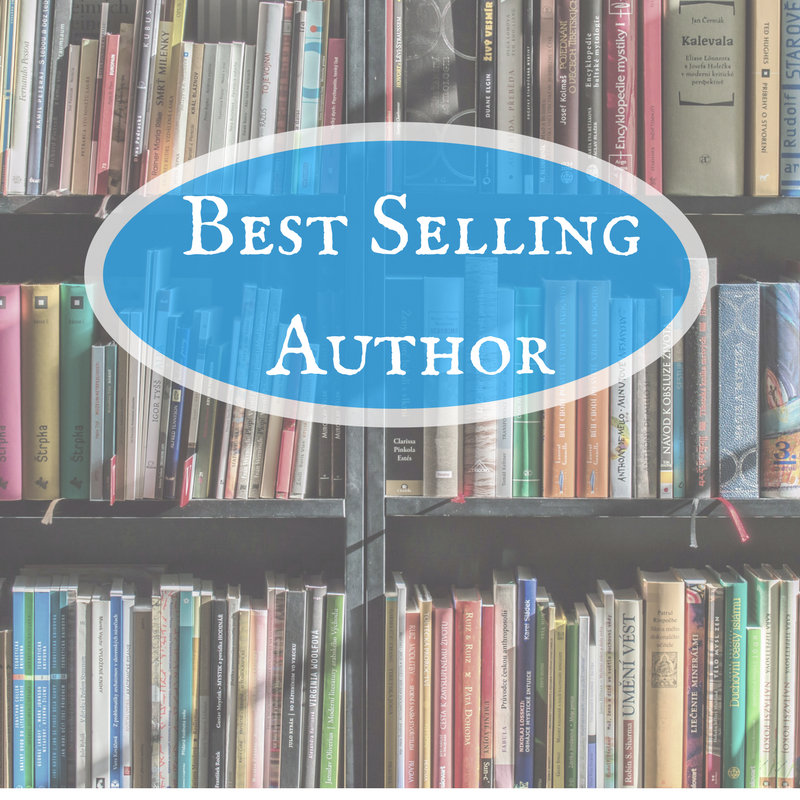Can you share a little about your recent book?
Burdened by his past, fighter pilot Lt. Adler Paxton battles the Luftwaffe over Nazi-occupied Europe as the Allies struggle for control of the air before D-day. Violet Lindstrom wants to be a missionary, but for now she serves in the American Red Cross, where she arranges activities at Adler’s air base in England. Drawn to the mysterious Adler, she enlists his help with her programs for local children. Adler finds his defenses crumbling. But D-day draws near. And secrets can’t stay buried forever.

Why do you write? Do you have a theme, message, or goal for your books?
I write because I can’t stop. The stories won’t leave me alone. I never start a novel with a theme in mind, but the theme develops from the characters and what they’re learning.
In the Sunrise at Normandy series, the heroes are three brothers who are estranged from each other. Forgiveness is the overarching theme of the series, and each novel in the series explores forgiveness from a different angle.
How long have you been writing?
Almost twenty years now.
And how long did it take you to get your first major book contract? Or are you published non-traditionally? How did that come about?
It took several years before I was ready to submit, and then I had five years of rejection letters before receiving my first contract. My first contract resulted from a submission to an editor at Mount Hermon Christian Writers Conference, and my first novel, A Distant Melody, was published ten years after I first started writing.
Which of your books is your favorite?
I have three adult children. I have no favorites. Same with my books.
Do you have a favorite character or scene in one of your books?
In The Sky Above Us, there are some heart-wrenching scenes—I take perverse pleasure writing those. There are some action scenes—the hero is a fighter pilot on D-day—and those scenes were great fun to write. But the scenes I loved writing most were when Adler and Violet were together and bantering.
How long does it take you to write a book?
I write one book a year—that involves research, outlining, the rough draft, editing, and promotion.
What’s your writing work schedule like?
It’s definitely a full-time job! Since I’m not a morning person, I spend my mornings on emails, social media, and business aspects of writing. Over lunch, I read research books. In the afternoons, my brain kicks in and I focus on the actual writing.
Do you have an interesting writing quirk? If so, what is it?
I don’t think so. I don’t need special candles or snacks or music. When I started writing, my kids were little, so I learned to write anytime and anywhere. Even though I have a quiet empty nest and my own office now, those habits have continued.
What has been your greatest joy(s) in your writing career?
While contracts and awards are wonderful, my absolute favorite moments are when I receive a message from a reader that one of my books touched them deeply. When I hear that a story helped a reader through a difficult time, or that a character’s journey gave the reader a personal insight, or that God used a story to teach courage or forgiveness or humility—well, those fill me with incredible joy.
What has been your darkest moment(s)?
Probably a bad contest score at the end of my rejection-letter years. I felt very confident about my entry and was convinced it was my year. It wasn’t. What hurt more than the score—which was pretty brutal—was that I’d already submitted the same entry to editors at Mount Hermon. For a few days I was convinced I’d wasted years of my life in a futile attempt to get published. But family and friends and the Lord bolstered me. And that submission at Mount Hermon was the one that led to my first contract.
How many times in your career have you experienced rejection? How did they shape you?
I lost count. For five years, my first novel was rejected by just about every editor and agent in the business. But I wouldn’t trade those years for anything. Not only did I improve in my writing and in my knowledge of the publishing industry, but the Lord used it to teach me about humility and His sovereignty and His perfect timing.
Where do you get your ideas?
All sorts of places—historical events, news articles, what-if questions, songs, even from a dream.
Who is your favorite author to read?
Too many to name!! I hate to list any because I might accidentally omit writers I love.
What advice can you give aspiring writers that you wished you had gotten, or that you wished you would have heeded?
Patience, patience, patience. I received this advice over and over but resisted it. Over time I’ve learned to trust in God’s perfect timing.
What are common mistakes you see aspiring writer’s make?
Rushing to publish. The advent of self-publishing has been a wonderful gift, but many promising writers now publish after—or before—the first rejection. It takes time to learn the craft of writing, and those rejections and contest losses teach you vital lessons.
Where/How do you recommend writers try to break into the market?
Writing conferences. I can’t recommend conferences highly enough. You learn about the craft and the industry. You meet publishing professionals and get to know them as human beings. You receive professional feedback and often have the opportunity to pitch or submit. And you meet other writers on the journey and forge lasting friendships.

Sarah Sundin is the bestselling author of historical novels, including The Sea Before Us, The Sky Above Us, and The Land Beneath Us (coming February 2020) Her novel The Sea Before Us received the 2019 Reader’s Choice Award from Faith, Hope, and Love, When Tides Turn and Through Waters Deep were named to Booklist’s “101 Best Romance Novels of the Last 10 Years,” and Through Waters Deep was a finalist for the 2016 Carol Award and won the INSPY Award. A mother of three, Sarah lives in California. Please visit her at www.sarahsundin.com
Facebook: SarahSundinAuthor
Twitter: sarahsundin
Pinterest: sarahsundin

Find her books at:





No Comments